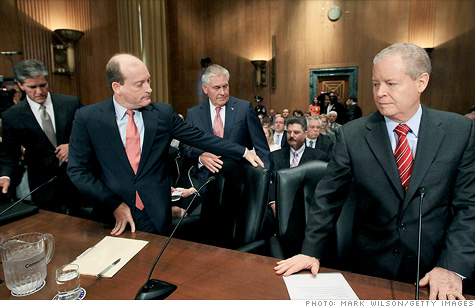Search News

Big oil execs on Capitol Hill to defend their tax breaks.
NEW YORK (CNNMoney) -- Are you afraid of an audit? Well, just be glad you aren't running a giant oil company.
The Internal Revenue Service keeps 35 agents stationed full time at Exxon Mobil's Houston headquarters, conducting a full-time audit of its books in office space provided by the company.
Why? Because the corporate tax code is so complicated, keeping IRS agents in Houston is actually the easiest thing for both the IRS and Exxon (XOM, Fortune 500) -- where tax returns run 20,000 pages.
The U.S. corporate tax code is often described as "inefficient" and "complex." It is never described as "good." At the root of the problem: A system of inverted incentives that encourage corporations to lobby for special tax breaks -- and politicians to insert them into the code.
The corporate tax rate is purportedly 35%, one of the highest in the world. But not every corporation pays that rate. In fact, some companies are so good at taking advantage of special tax breaks, they pay no taxes at all.
Howard Gleckman, resident fellow at the Tax Policy Center, calls modifications to the tax code a "perpetual motion machine."
Corporations pay lobbyists. Lobbyists convince lawmakers to add tax breaks. Lawmakers modify the tax code. Corporations hire lawyers and accountants to comply with the new rules. The IRS scrambles to keep up.
All the modifications amount to government spending by another name. Businesses don't get a check from the government, but they save money just the same. And the federal government ends up with less tax revenue, adding to deficits. (Parsing Exxon's tax bill)
"All of that complexity didn't get in the tax code by accident," Gleckman said. "And it didn't get in there because some politician had a great idea. It got in because a business requested it."
It wasn't always like this. The corporate tax code was overhauled during the Reagan administration, which cleared special tax breaks out of the code. The clean slate didn't last long.
"In 1986 we cleaned out all this stuff, and in 1987 we started putting it back in," Gleckman said.
It all starts with businesses seeking an advantage -- whether to keep up with foreign competition, or to honor their fiduciary duty to shareholders. Enter the lobbyists. (Big Oil's $38 billion defense)
In 2010, Exxon employed 50 lobbyists, and spent $12,450,000 to influence lawmakers, according to the Center for Responsive Politics. What does that buy you?
Over time, it buys a raft of tax breaks. And the process is repeated across every industry. NASCAR racetrack owners are allowed to write off the costs of their racetracks. There's the sweet deal for companies that make Puerto Rican rum.
For all the money and time spent on this process, the results are not pretty.
In order to keep up with changes in the tax code, corporate America is forced to hire lawyers and accountants at great cost. They help companies minimize their tax base, and bring home the bacon for shareholders.
But those lawyers advise their bosses to do funny things, like stash cash overseas to avoid repatriation taxes. And sometimes corporations even make business decisions based on the tax breaks involved.
Eventually, the chickens will come home to roost.
Some companies -- like GE -- have taken a cue from the tax code and structured themselves in a way designed to keep taxes very low, Gleckman said.
If the tax code is reformed, say to a 25% maximum rate that wipes away special tax breaks, GE will suffer because they pay close to 0% under the current system.
"If we dramatically change tax laws, GE would have to restructure itself again, and that's a very expensive proposition," Gleckman said.
Any reform will create winners and losers, and companies that have relied on generous tax breaks will be hardest hit.
"The nature of Washington is such that the losers will howl, scream, and hire lobbyists to protect their interests," Gleckman said.
Some companies -- entire industries even -- would be in danger of fading away.
Two prominent examples: The ethanol and solar industries.
"These are companies that not only take advantage of tax breaks, but they wouldn't even exist without them," Gleckman said. "The stakes are higher for them."
Politicians from both sides of the aisle agree that corporate tax reform is necessary. They disagree on what the target rate should be, but everyone recognizes the need for change.
However, it's probably not coming soon. The Obama administration has yet to release a detailed plan for reform, and the prospects of passing any kind of reform during an election year are dim. That leaves lawmakers with a narrow window to act.
"At 20,000 feet, corporate tax reform looks great," Gleckman said. "But when you start looking at the nitty-gritty, suddenly it doesn't sound so good ... it's extremely complicated." ![]()
| Latest Report | Next Update |
|---|---|
| Home prices | Aug 28 |
| Consumer confidence | Aug 28 |
| GDP | Aug 29 |
| Manufacturing (ISM) | Sept 4 |
| Jobs | Sept 7 |
| Inflation (CPI) | Sept 14 |
| Retail sales | Sept 14 |